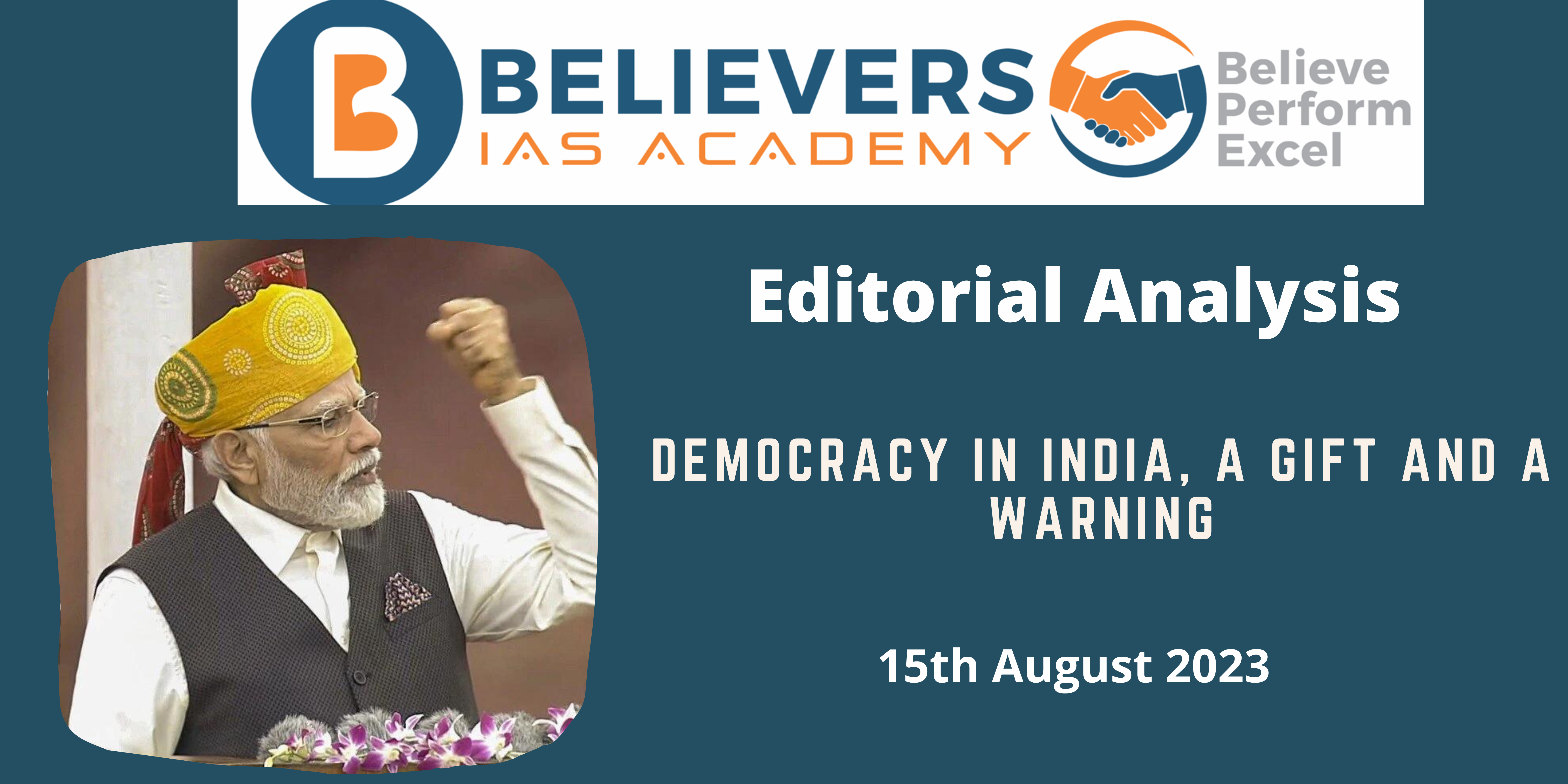Democracy in India, a gift and a warning
Context:
With reference to India’s 76th year of Independence and the Prime Minister’s claim of India being the “mother of democracy.” It questions whether this claim holds merit and introduces the central theme of the article: the comparison of democratic practices in ancient India and Greece.
Relevance:
GS – 02 (Indian Polity and Governance)
Mains Question:
- Discuss the historical evidence supporting India’s claims of democratic governance in ancient times and compare it to the Greek model of democracy. How does this perspective reshape our understanding of democracy’s origins and evolution? (250 words)
Dimensions of the Article:
- Ancient Indian Democratic Seeds
- Dr. Ambedkar’s Insights
- Theravada Buddhist Scriptures
- The Gana and Sangha Dynamics
- Limitations and Omissions
- Echoes of Omissions
- A Universal Thread
- Safeguarding Democracy
Ancient Indian Democratic Seeds:
- Delving into the antiquity of India’s democratic claims, shadows of democratic hues appear. Hints within the Rig Veda, that age-old sacred text, paint a picture of governance that leans towards popular participation.
- Faint references to fair resource sharing, amicable deliberations, and conflict resolution appear. Consider the figures of Gramini, the village head under the king’s employ, as well as the Atharva Veda’s allusions to sabha, samiti, babhapati, and sabkasad, primarily engaged in judicial tasks.
- Despite these glimpses, tangible evidence remains scarce, and claims of a full-fledged “democracy” find shaky footing. However, Dr. Ambedkar’s contentions gain a more solid stance, placing democratic practices in the Buddhist era, contemporaneous with the Greek city-states.
Dr. Ambedkar’s Insights:
- Dr. Ambedkar’s connection to Western constitutional frameworks is overshadowed by his profound inspiration from India’s democratic heritage.
- The man in his three-piece suit, conversing in formal English, draws more from the democratic essence of ancient India, particularly the Buddhist sanghas.
- As the architect of the Constituent Assembly’s Drafting Committee, Ambedkar argues that Indian republicanism stretches back into time. Ancient republics like the Lichhavis of northern Bihar and Nepal, the Mallas in Kusinagara, and the Vajji confederation in Vaishali emerge.
- These gana sanghas, present between the 6th and 4th centuries BCE, lay the groundwork.
Theravada Buddhist Scriptures:
- The Vinay-pitaka, a Theravada Buddhist scripture, unfolds a world of democratic rituals in India. Monks, known as Bhikkhus, engage in debates, motions, and secret ballot voting within their sanghas.
- Diodorus Siculus, the Greek historian, casts a lens on India during Alexander the Great’s era, revealing independent democratic republics.
- These republics, although hosting a monarch and a deliberative assembly, wielded power collectively. Financial, administrative, and judicial authority found its home in the gana sanghas, contributing to a dynamic governance model.
The Gana and Sangha Dynamics:
- Ancient India’s democratic landscape is vividly painted in the Pali Buddhist scriptures, illustrating the city-state of Vaishali in the 5th century BCE. Various groups managed affairs, ranging from warrior formations to economic associations and religious fraternities.
- The terms “gana” and “sangha,” evolving from meaning “multitude,” transition into representing self-governing collectives. Decisions within these sanghas are internally crafted, solidifying governance conventions. Some stand as sovereign entities akin to republics, akin to the city-states of Greece.
Limitations and Omissions:
- Ambedkar’s gaze, while celebratory, turns critical towards the notion of self-governing village republics, popularized by Gandhi.
- Village realms, viewed as reservoirs of caste-based oppression and socio-economic stagnation, dim the romantic light. Ancient Indian villages operated democratically to an extent, as evidenced by Kautilya’s Arthashastra, tracing village administration customs in antiquity.
- Mauryan, Chola, and Gupta periods echo the pulse of village panchayats. However, Ambedkar’s piercing insight uncovers an unsettling truth – the glaring omission of an entire class- the Untouchables.
Echoes of Omissions:
- In this revelation, Ambedkar uncloaks a parallel in Greece, where slaves and barbarians remained devoid of rights.
- History extends the same exclusion to an even broader community – women – across the globe until the 20th century.
- Within the realm of male citizens, India’s ancient village republics align with Greek city-states in democratic essence.
A Universal Thread:
- David Stasavage, the American political scientist, threads together history’s fabric, showcasing efforts to counterbalance political power across the globe.
- The pursuit of institutions limiting any singular authority transcends civilizations and eras. Here, Indian democracy and its Greek counterpart stand as elemental manifestations of human governance.
- Democracy, not an invention, but a fundamental pattern woven into humanity’s tapestry, arises from diverse corners.
Safeguarding Democracy:
- Amidst reflections on the past, Ambedkar’s concerns emerge. He foresees a democratic transformation morphing into dictatorship while retaining a democratic facade.
- His words, a cautionary echo, resonate against self-praise. A potent reminder exists – democracy, our gift to ourselves, necessitates vigilant protection, a treasure that could be wrested away if left unguarded.
Way Forward:
- Reshaping historical narratives presents an opportunity to ponder, evolve, and safeguard our democratic values. Recognizing democracy as a shared heritage across civilizations, regardless of origin, enables a more inclusive perspective. As we navigate modern complexities, learning from past triumphs and failures, democracy’s essence remains a lodestar.




